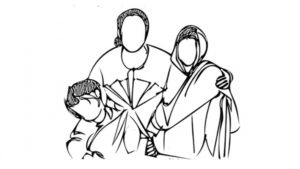The four jewels of inclusive communities
Head of Research, Al Mathers, explains why working in partnership with communities is critical to meaningful project delivery, and outlines the four key features of an inclusive community.
At the moment we’re riding a wave of UK optimism regarding the active role communities and community organisations can play.
Very few initiatives, funded or otherwise, do not involve a community dimension. Steering groups, fundraising, advocacy, co-design – these have become part of the common language of project delivery. All of which rely heavily upon the often voluntary contribution made by individuals and groups, improving the daily life of people.
Across sectors, academic, public and charitable organisations are often unable to access and attract funding without a community partner. Private businesses are also increasingly focused on developing close connections with communities, not purely as a corporate responsibility, but also in order to understand new and untapped markets. From our experience this is never truer than in the fields of social and digital inclusion.
So working in partnership with communities is critical.
From collaborative planning to participative practice to user research and service design, without the inclusion of people who will ultimately benefit or fall foul of new developments, we can only design to meet people’s needs as far as our professional understanding allows us.
But a community needs to be strong to give of itself, just as individuals do.
At Good Things Foundation, we’ve learned from the Online Centres Network that inclusive communities, and the networks of organisations within them, create the foundation from which community movements and social change can grow organically.
They create the opportunity to enrich the lives of even the most vulnerable and create strength from the ground up.
Nurturing people is something many in the charitable sector would recognise as a calling, yet we need to see it as a critical building block in community and societal sustainability.
Vulnerability
People can be vulnerable for a variety of reasons. Poor health or disability, lack of social connections, lack of financial security, cultural barriers, gender inequalities, and lack of access to basic life needs. The inequality gap in the UK is huge, with 14 million people living in poverty, 9 million people lonely or isolated and 11.3 million lacking basic digital skills.
However, as part of our Social Inclusion Programme, working with communities through our English Language programme, English My Way, we’ve shown that vulnerability and inequality does not have to be a constant state.
Alongside the development of skills, this programme revealed four key dimensions that move people from a state of social isolation to a point where they are better equipped, more resilient and open to being part of an active community, and able to reap the personal benefits but also to share the rewards with others.
The four jewels
1. Relationships
Being able to connect with others on a personal and community level, with equal interactions

2. Participation
Having the confidence to communicate views, share ideas and be an active participant in decisions that affect your life

3. Independence
Being understood, in control of your life, able to go about everyday life confidently and fulfill your own potential to progress.

4. Shared Sense of Place and Culture
Re-negotiating your cultural identity whilst feeling a sense of belonging
What’s important when understanding these, is that they are experiential, soft, and person-led demonstrations of inclusion. They are particularly needed in communities where there is a changing demographic, influx of new migrants, or a population vulnerable to continued austerity.
It’s the missing first step.
That before someone is in a position to be an active contributor to the health and sustainability of their community, we need to invest in building their own resilience, sense of self-value, and identity.
Understanding, not measuring
As many staff and volunteers in Online Centres have told us, experiential dimensions continue to be difficult to measure, but include noticeable changes such as when someone is:
- More comfortable in the presence of others
- More trusting
- Takes greater care of themself
- Lives a less chaotic life
- More reliable
- Happier
- More confident
- More self assured
But time and again, it is the less measured and the more ‘felt’ outcomes that sit at the heart of lasting social change. Yet without formally recognising them and understanding their worth, the richness of practice that creates these in the lives of people and communities often goes underplayed and under-resourced.
In How We Change the World, Good Things Foundation’s Theory of Change, we talked about the way in which we see this change happening within Online Centres through the support that tutors, volunteers, and peers provide.
This research is helping to guide our future social inclusion work. If you could help us develop this thinking please get in touch with our Head of Research and Exploration alice.mathers@goodthingsfoundation.org

